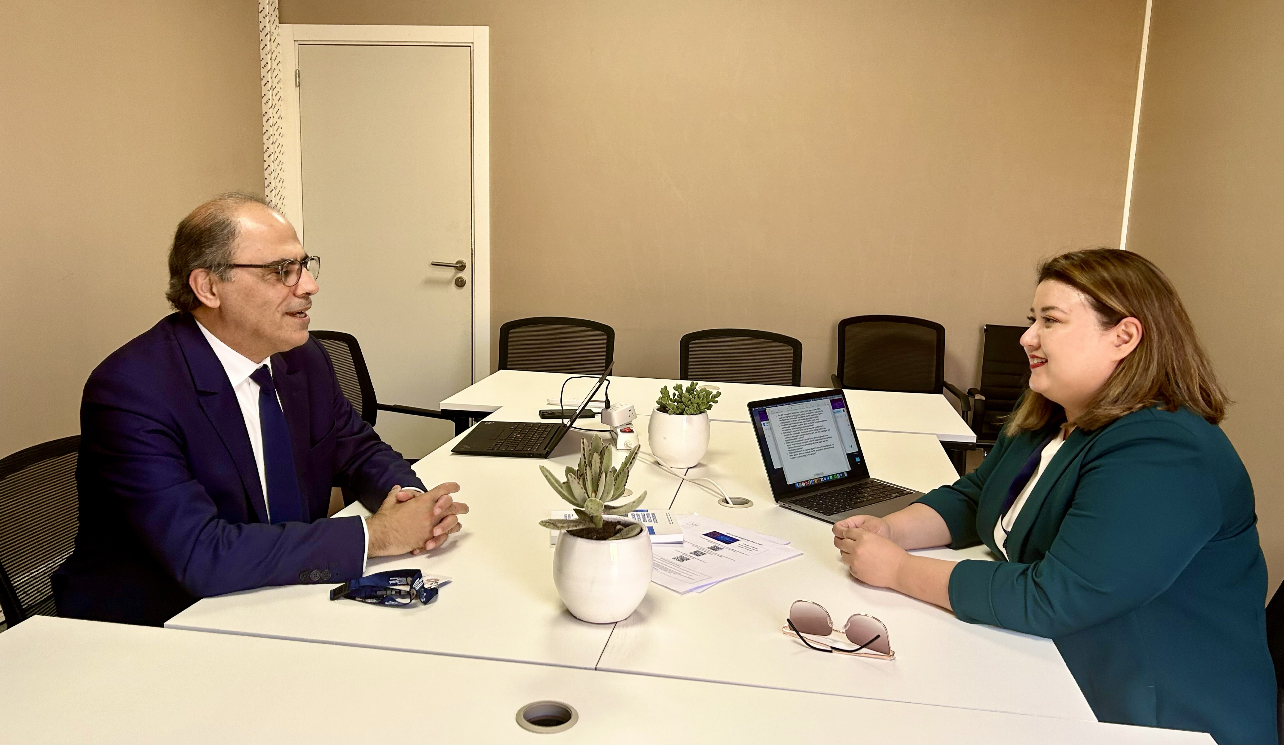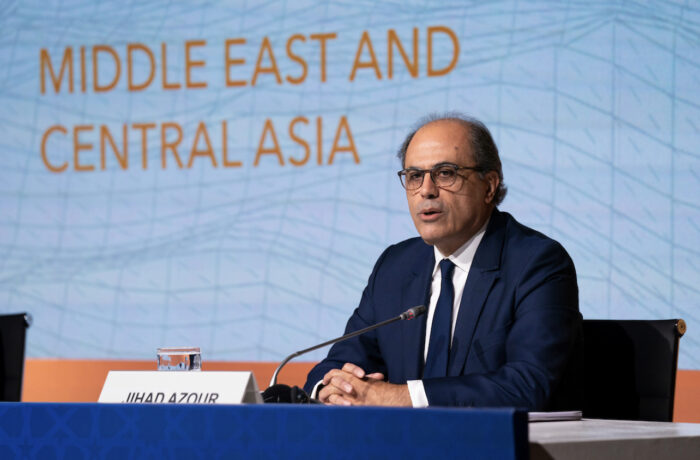MARRAKECH — During the Annual Meetings of the International Monetary Fund (IMF) and the World Bank in Marrakech last week, Jihad Azour, Director of the Middle East and Central Asia Department at the IMF, discussed the economic outlook and policy recommendations for Kazakhstan and the broader Central Asian region an interview with The Astana Times. The conversation covered a range of crucial topics, from addressing inflation and diversifying economies to the impact of climate change and promoting financial inclusivity.

Jihad Azour, Director, IMF Middle East and Central Asia Department and The Astana Times’ Aida Haidar discussing IMF’s initiatives to support countries in the region in their transition towards a sustainable future. Photo credit: The Astana Times.
Inflation and economic stability
One of the short-term priorities highlighted by Azour was inflation. He noted that while inflation rates are gradually declining, it remains a concern that needs careful management. The IMF advises countries to stay vigilant and adjust policies to control inflation effectively.

The GDP growth in the Caucasus and Central Asia (CCA) region is relatively robust – 4.6% in 2023, according to IMF Regional Economic Outlook unveiled on Oct. 12 in Marrakech. Photo credit: IMF.
Given the global trend indicating that rates might stay “higher for longer,” countries with open economies and flexible exchange rates, such as those in Central Asia and the Caucasus, need to monitor this development closely.
“Countries in the region have not been negatively affected, I would say that some of them have benefited from inflows of people and capital, also increase in trade, which is an element that helped in accelerating the recovery last year and also provided the support for the growth this year,” Azour said.
Diversification and structural reforms
Azour emphasized the importance of diversifying economies in the medium term. Structural reforms, particularly those that improve labor markets, financial sectors, and governance, were highlighted as powerful tools for driving economic growth and fostering inclusivity. The IMF’s outlook demonstrates how well-implemented structural reforms can have a significant positive impact on these countries.
“Even in a low growth trajectory, the reforms could help improve the outlook, create more opportunities, and more jobs,” he said.
Azour suggested that maintaining fiscal stability is also a critical concern, given the various external shocks experienced by the region, such as the conflict in Ukraine, and the COVID-19 pandemic. Coordinated fiscal policies and structural reforms can enhance economic confidence and provide direction, according to Azour.
Structural reforms involve prioritizing the removal of the most significant obstacles to economic activity, combining reforms in areas such as governance, business deregulation, and external sector improvements with other reforms, such as those in the labor market and credit sector, to maximize the early benefits of the reform process.
“The pandemic led to a certain number of measures to reduce the impact of the shock on the people as well as on the private sector. The well-coordinated policy management in the medium-term framework will provide additional confidence and give direction. Those are the policies that we recommend, of course, a country like Kazakhstan is already an open economy with strong trade and financial links. Therefore, implementing these reforms would only benefit the Kazakh economy,” he said.
Transition to sustainable energy amid climate change
According to Azour, diversifying away from fossil fuels, especially in a country heavily reliant on them, necessitates efforts to strengthen other sectors, promote structural reforms, and enhance public finances.
“It is important to invest in the growing sectors, and the climate is one. Climate transformation is an issue that we need to address, but technology also could become a potential growth enabler. I know that technology is well advanced in Kazakhstan, including on the financial services side. Those are promising sectors,” he said
Azour acknowledged the increasing impact of climate change on the region, with Kazakhstan experiencing unusual climatic events, including water scarcity.
“We have highlighted how over the last two decades, the increase in temperature because of climate deterioration has affected not only the environment but the overall social and economic stability of certain countries. We recognize that our countries are not among the highest emitters, but they, I would say, feel the heat. Therefore we need to help those countries to accelerate their adaptation,” Azour said.
The IMF has been assisting countries in adapting to climate change with its new facility, the Resilience and Sustainability Facility (RSF), providing policy support and financial assistance to help countries design and implement climate-resilient transformations.
“We as an institution finance reforms. We don’t finance projects, but we provide this framework, helping countries set priorities and aligning the nature of our financing to be more long-term to the needs of this transformation. This is what the new facility provides,” he said.
The IMF director noted his support for Kazakhstan’s ambition to become carbon neutral by 2060.
Kazakhstan, renowned for its abundant fossil fuel resources over the last three decades, has set its sights on a transformative goal: achieving carbon neutrality by 2060. This ambitious objective raises a fundamental question: how can Kazakhstan transition without imposing a heavy burden on its economy and the livelihoods of its people? According to Azour, there are two critical priorities for oil and gas exporting countries such as Kazakhstan.
The first is economic diversification. Kazakhstan has made commendable strides in this direction, but the IMF recommends accelerating these efforts. This involves implementing structural reforms, enhancing the business environment, and increasing labor productivity.
Allowing the private sector to flourish is also essential, Azour said. By expanding beyond the oil and gas sector, Kazakhstan can reduce its reliance on these finite resources and create a more resilient and dynamic economy.
Another critical aspect of Kazakhstan’s transition is reducing its dependence on oil and gas revenues to bolster public finances. This will increase fiscal independence and stability. The country should also address the impact of climate change. Investing in adaptation measures is essential to minimize the adverse effects of climate events.
In this regard, Kazakhstan can draw from the expertise of organizations such as the IMF.
“This is where Kazakhstan can benefit from the experience and expertise of the fund in helping to set the roadmap, but also from other organizations who also provide financing and project support to reduce the impact of climate on the life and livelihood of people and also to reduce the risks of climate events. This is, for example, what we have done with Morocco. In the recent $1.3 billion RSF program. It has a component dedicated to strengthening the resilience against shocks,” he said.
Kazakhstan’s journey to carbon neutrality is undoubtedly challenging, but the potential rewards are substantial. In a world increasingly focused on environmental sustainability, the country’s ability to navigate this path successfully will determine its role on the global stage and whether it avoids the heavy cost of remaining fossil fuel-dependent.
Azour mentioned a few successful cases from countries in the Middle East and Central Asia that have made strides in transitioning to renewable energy sources. Morocco, Tunisia, the United Arab Emirates, and Saudi Arabia have embraced clean energy initiatives, demonstrating the potential for economic growth through sustainable practices.
Promoting regional cooperation
Azour also highlighted the importance of regional cooperation in Central Asia, particularly in trade and connectivity. He notes that recent geopolitical events present both challenges and opportunities for strengthening regional connections. The IMF supports initiatives that promote trade integration and infrastructure development, including electricity networks and financial market integration.
“We are happy to see greater cooperation between Caucasus and Central Asia, as well as other regions. For example, this year, a summit took place between the Gulf Cooperation Council (GCC) and the Central Asian Countries (CCA) to promote regional cooperation….Of course, this is very important to build a new, I would say, growth model for the region and bring back the level of growth to what it was a decade ago to allow those economies to converge faster with the emerging European countries,” he said.
According to Azour, technological advancement is equally pivotal, as it aids in creating a thriving tech ecosystem and attracting substantial investments. He highlighted that strengthening financial services integration represents a critical dimension. Establishing more unified financial markets among different Central Asian countries is a crucial step toward deepening regional integration.
Financial inclusion and tax framework
Azour also highlighted that improving financial inclusion, enhancing market access, and narrowing gender gaps are essential to economic growth. Kazakhstan’s progress in these areas was noted, but there is room for improvement.
“We encourage countries to accelerate their transformation in terms of modernizing their tax administrations when it comes to tax policies. Also, we still think that national revenue mobilization has the potential to increase the capacity of governments. This is not only to provide revenues to the state but also to improve the equity situation by having progressive tax regimes by reducing the gaps that exist in any tax system. Increasing the coverage of the tax base would also be useful for the long term because, in the long term, a country like Kazakhstan will be less dependent on oil revenues,” he said.
Jihad Azour concluded that while challenges exist, opportunities for growth, sustainability, and inclusivity remain within reach through strategic policies and international collaboration. The IMF stands ready to support these nations on their path toward a more resilient and prosperous future.

